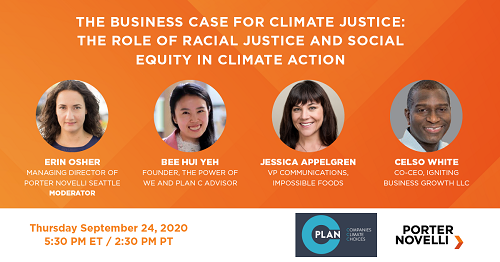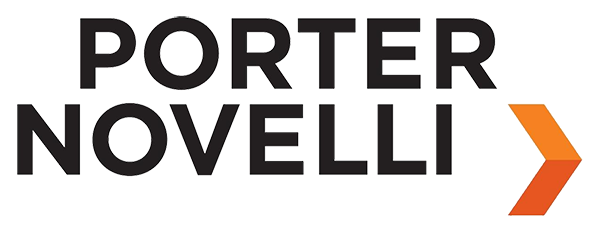Key Takeaways From Climate Week: The Business Case for Climate Justice

Key Takeaways from Climate Week: The Business Case for Climate Justice
In the context of the news this week, we find ourselves in another pivotal moment. Not only is it Climate Week, but the U.S. faced yet another racial injustice in Breonna Taylor’s court ruling. Today’s newsletter addresses these issues and how they, and so many other issues of today, intersect.
Porter Novelli and strategic partner Plan C joined together for a Climate Week virtual event on the business case for climate justice. The theme of the session was the role of racial justice and social equity in climate action. We heard from Jessica Appelgren of Impossible Foods; Celso White of Igniting Business Growth LLC; Bee Hui Yeh of the Power of We and Plan C and Erin Osher, Managing Director of Porter Novelli Seattle. Here, we’ve highlighted five key takeaways from the event:
- This movement is intersectional: Each of these issues are not in their own silos. Whether it is COVID-19, climate change or food insecurity, racial and social justice are woven through each. This fact empowers companies like Impossible Foods to find their purpose of fighting the causes of climate change, while also addressing the inequitable impacts on Black and Brown communities. Jessica Appelgren gave an example of Impossible’s recent work with Colin Kaepernick’s Know Your Rights Camp to provide meals to food insecure areas disproportionately impacting Black communities.
- People at the center of business strategy: In the discussion, Bee Hui Yeh stated she “would love to see us shift our framing and mindset from ‘do less harm’ to ‘where can we do more good.’” Whether it is employees or the community a business is in, systematic racism and climate change are affecting individual stakeholders. Even in B2B business models, there is an end user who is an individual. At the end of the day, the decisions businesses make (good or bad) impact people.
- Change takes a lasting commitment: Climate change, racial and social injustice, food insecurity – these are not hot button issues for a one-day solve, they take deep-rooted, abiding dedication to create change. With scores of different issues, a company may feel it must take on; it is easy to get lost in short-term solutions. But these won’t create a lasting impact on society. “You need to have a long-term plan. Yes, look at the place in time, but focus on what will happen in the future,” advised Appelgren.
- Leadership buy-in is essential for success: When deciding if or when to act on an issue, it must stem from a company’s leadership and Purpose. Celso White stated that if you don’t “start with the CEO, it is going to be siloed … and the possibilities for success are small ... it must be embedded and cascaded throughout the organization.”
- Not perfection, but progress: Hui Yeh reinforced this during the conversation that it is okay to fail, to be “cancelled.” It’s how a business responds and that it tries to move forward that matters. Humility in the face of feedback is key. The session brought light to the fact that businesses can’t let setbacks, or even the fear of setbacks, stop them from doing anything. Even if it’s only small steps forward, they are actions to future progress.
By the end of the event, listeners were not only able to understand the intersectionality of all the challenges we face today but were armed with steps that every business can take to meet this moment head on. To close, we leave with these words of wisdom from White; “Take time to reflect on everything that has taken place around us today and work on the few things where you can truly make an impact.”

